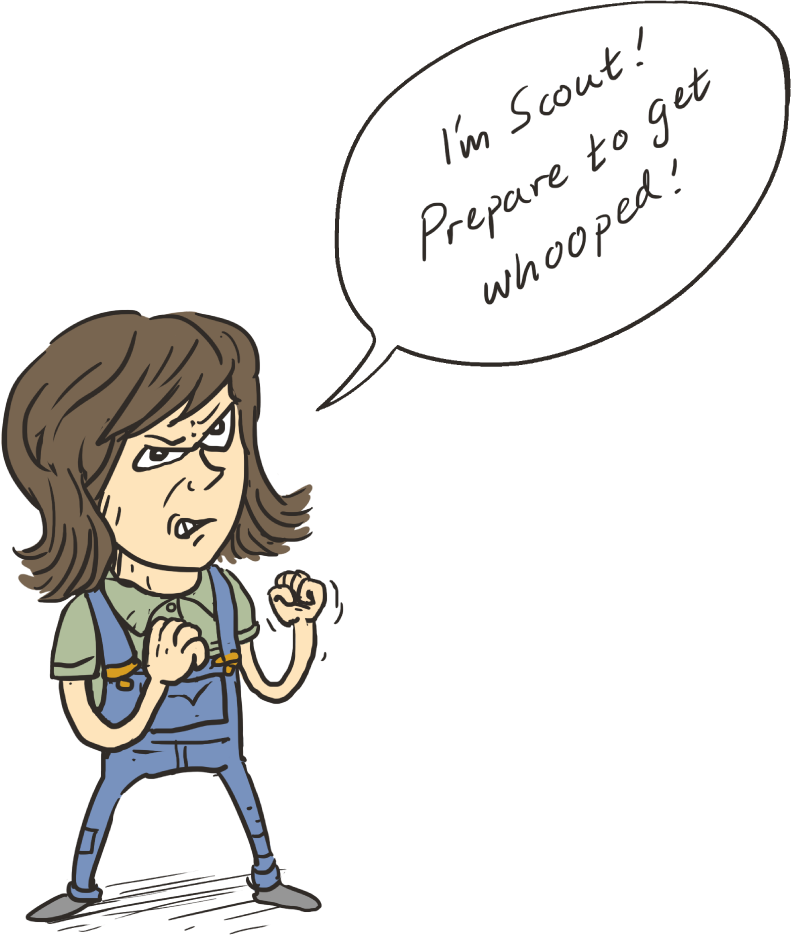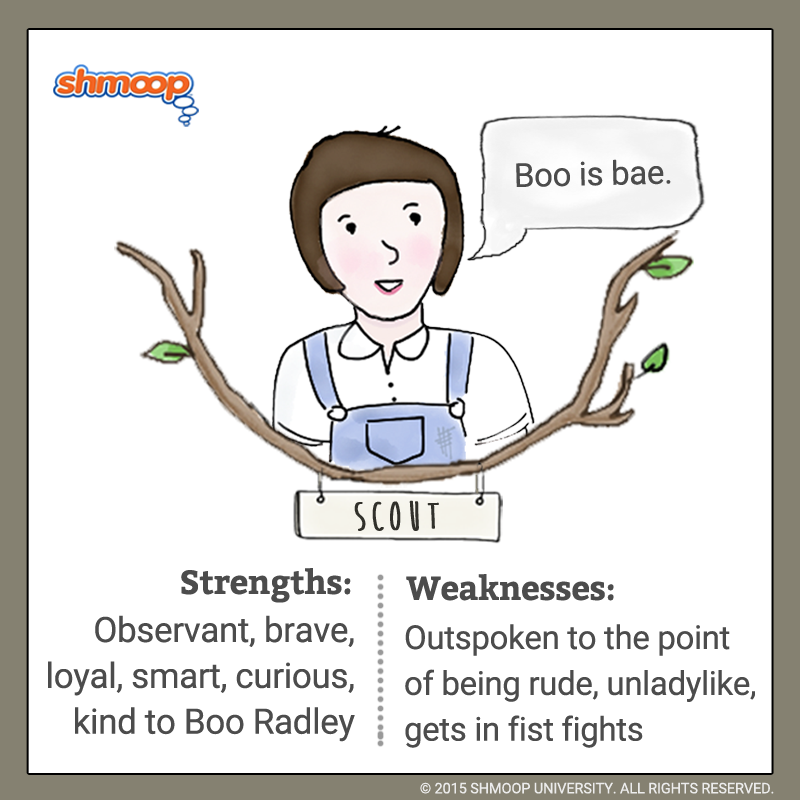Character Analysis
TKAM: Quotes
Scout's Honor
Scout may or may not be a lover, but she's definitely a fighter. At the beginning of To Kill a Mockingbird, fighting is her solution to everything: she goes after Walter Cunningham after she gets in trouble on his behalf on the first day of school, she beats up Dill when she thinks he's not paying enough attention to her, and she kicks a member of the lynch mob (where it counts, no less) when he grabs Jem. When news of Atticus's defense of Tom Robinson percolates down to the schoolyard, it's no wonder that she responds with her fists to the kids' ugly name-calling.
So, why the short temper? Well, for one thing, she does seem to win her fights most of the time, so it's a technique that's working for her. For another, if might makes right, then she doesn't need to worry about the trickier business of figuring out the moral right: righteousness goes to whoever is the better fighter. Scout's fighting shows her quick temper and lack of self-control, but it also suggests that she's kind of a simpleton when it comes to moral matters. She wants a quick fix to complicated questions. (To be fair, she is six.)

While Scout doesn't see a problem with her Mortal Kombat approach to dealing with people, Atticus thinks otherwise, and tells Scout not to fight any more. Scout grumbles, but manages it at least some of the time, starting with her classmate Cecil Jacobs.
I drew a bead on him, remembered what Atticus had said, then dropped my fists and walked away, "Scout's a cow- ward!" ringing in my ears. It was the first time I ever walked away from a fight.
Somehow, if I fought Cecil I would let Atticus down. Atticus so rarely asked Jem and me to do something for him, I could take being called a coward for him. I felt extremely noble for having remembered, and remained noble for three weeks. (9.30-31)
Lesson #1: Moral superiority feels good. Lesson #2, which comes later: there are more reasons against fighting than obedience to Atticus and getting to feel noble. Even then, however, she does maintain a few private exceptions: "I would fight anyone from a third cousin upwards tooth and nail" (10.6).
Well, you have to draw the line somewhere.
Girls Rule
As you might have guessed, Scout doesn't have much interest in stereotypical girl things, like dolls and dresses. Her tomboyish nature drives prim Aunt Alexandra crazy, and Aunty comes to stay with her brother and his family in part to try to make a proper little girl out of Scout. First task: giving up the overalls.
Aunt Alexandra was fanatical on the subject of my attire. I could not possibly hope to be a lady if I wore breeches; when I said I could do nothing in a dress, she said I wasn't supposed to be doing things that required pants. Aunt Alexandra's vision of my deportment involved playing with small stoves, tea sets, and wearing the Add-A-Pearl necklace she gave me when I was born; furthermore, I should be a ray of sunshine in my father's lonely life. (9.74)
Scout takes Aunt Alexandra's crusade against her pants as also against her freedom, and she doesn't seem too far off. For Scout, being a lady-in-training means giving up all the things she likes to do and replacing them with what others expect her to do, and she'll have none of it: "I felt the starched walls of a pink cotton penitentiary closing in on me, and for the second time in my life I thought of running away" (17.24).
While Scout doesn't ever renounce her tomboyish ways, she does come to recognize that being a lady has some value. When Aunt Alexandra puts her game face on to return to her tea party after hearing of Tom's death, Scout takes pride in following her lead: "After all, if Aunty could be a lady at a time like this, so could I" (24.93). While she still isn't comfortable with the rules ladies have to follow and the skills they have to cultivate, Scout does pick up on the examples of the strong women in her life (not only the formidable Aunt Alexandra, but also her sharp-tongued, no-nonsense neighbor Miss Maudie) to make some kind of peace with her gender.
Boo!
Jem and Dill might say they're scared of Boo, but they're older: they like to test themselves by attempting to make indirect contact with Boo. Not Scout. She hangs back, terrified of bringing the monster's wrath down upon them. When she does get drawn into their schemes, she pays for it with sleepless nights.
Every night-sound I heard from my cot on the back porch was magnified three-fold; every scratch of feet on gravel was Boo Radley seeking revenge, every passing Negro laughing in the night was Boo Radley loose and after us; insects splashing against the screen were Boo Radley's insane fingers picking the wire to pieces; the chinaberry trees were malignant, hovering, alive. (6.84)
In Scout's mind, the whole world becomes dangerous, every sound signaling a threat. And later, when Scout realizes that it was Boo who brought her a blanket, she's nearly sick, as if realizing that she had just walked along the edge of a cliff in the dark and only survived by chance. Sure, this is partly just every kid's fear of the monster under the bed, but it also seems linked to Scout's fear that there might be unknown dangers lurking in the familiar—like the ugly racism simmering under Maycomb's surface.

(Click the character infographic to download.)
As time passes and Scout faces down more real threats, Boo stops seeming so scary. He lurks in her imagination not as a monster but as a neighbor, who feels familiar even though she's never actually laid eyes on him.
But I still looked for him each time I went by. Maybe someday we would see him. I imagined how it would be: when it happened, he'd just be sitting in the swing when I came along. "Hidy do, Mr. Arthur," I would say, as if I had said it every afternoon of my life. "Evening, Jean Louise," he would say, as if he had said it every afternoon of my life, "right pretty spell we're having, isn't it?" "Yes sir, right pretty," I would say, and go on. It was only a fantasy. (26.5-6)
This shift reflects Scout's unfortunately broader experience; now that she's seen the likes of Bob Ewell, poor Boo doesn't offer much in the way of chills anymore. Having faced the evil of real people, she just can't get as spooked by an apparently harmless shut-in. Or maybe her changing view of Boo has something to do with post-trial shifts in her ideas about community, and what makes for good neighbors.
The Good Neighbor
When Scout finally does meet Boo, she's grown up enough to give herself a good talking-to:
Neighbors bring food with death and flowers with sickness and little things in between. Boo was our neighbor. He gave us two soap dolls, a broken watch and chain, a pair of good-luck pennies, and our lives. But neighbors give in return. We never put back into the tree what we took out of it: we had given him nothing, and it made me sad. (31.23)
In other words, seeing Boo makes Scout see herself differently. And she's not necessarily happy about it. Atticus may have been right that putting yourself in another person's shoes allows you to understand them better—but he forgot to mention that it might also let you understand yourself a little bit better.
Scout may be exaggerating a bit when she thinks, "as I made my way home, I thought Jem and I would get grown but there wasn't much else left for us to learn, except possibly algebra" (31.31). (Like, what about calculus?) But she has learned a lot, not just this evening, but over the four years of the book. The question is, what will she do with this knowledge? What kind of person will she become?
Timeline